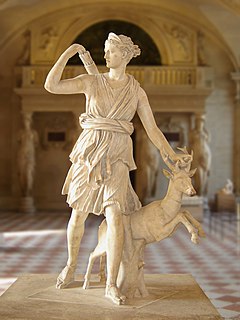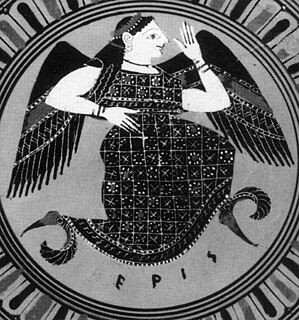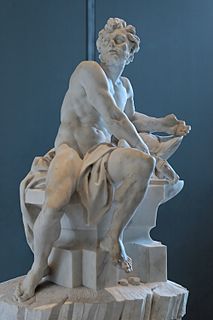 W
WIn ancient Greek religion and myth, the Anemoi were wind gods who were each ascribed a cardinal direction from which their respective winds came, and were each associated with various seasons and weather conditions. They were the progeny of Eos and Astraeus.
 W
WApollo is one of the Olympian deities in classical Greek and Roman religion and Greek and Roman mythology. The national divinity of the Greeks, Apollo has been recognized as a god of archery, music and dance, truth and prophecy, healing and diseases, the Sun and light, poetry, and more. One of the most important and complex of the Greek gods, he is the son of Zeus and Leto, and the twin brother of Artemis, goddess of the hunt. Seen as the most beautiful god and the ideal of the kouros, Apollo is considered to be the most Greek of all the gods. Apollo is known in Greek-influenced Etruscan mythology as Apulu.
 W
WAres is the Greek god of courage and war. He is one of the Twelve Olympians, and the son of Zeus and Hera. In Greek literature, he often represents the physical or violent and untamed aspect of war and is the personification of sheer brutality and bloodlust, in contrast to his sister, the armored Athena, whose functions as a goddess of intelligence include military strategy and generalship.
 W
WArtemis is the Greek goddess of the hunt, the wilderness, wild animals, the Moon and chastity. The goddess Diana is her Roman equivalent.
 W
WAthena or Athene, often given the epithet Pallas, is an ancient Greek goddess associated with wisdom, handicraft, and warfare who was later syncretized with the Roman goddess Minerva. Athena was regarded as the patron and protectress of various cities across Greece, particularly the city of Athens, from which she most likely received her name. She's usually shown in art wearing a helmet and holding a spear. Her major symbols include owls, olive trees, snakes, and the Gorgoneion.
 W
WEris is the Greek goddess of strife and discord. Her Roman equivalent is Discordia, which means "discord". Eris's Greek opposite is Harmonia, whose Roman counterpart is Concordia. Homer equated her with the war-goddess Enyo, whose Roman counterpart is Bellona. The dwarf planet Eris is named after the goddess.
 W
WHades, in the ancient Greek religion and myth, is the god of the dead and the king of the underworld, with which his name became synonymous. Hades was the eldest son of Cronus and Rhea, although the last son regurgitated by his father. He and his brothers, Zeus and Poseidon, defeated their father's generation of gods, the Titans, and claimed rulership over the cosmos. Hades received the underworld, Zeus the sky, and Poseidon the sea, with the solid earth, long the province of Gaia, available to all three concurrently. Hades was often portrayed with his three-headed guard dog Cerberus.
 W
WHelios, also Helius, in ancient Greek religion and myth, is the god and personification of the Sun, often depicted in art with a radiant crown and driving a horse-drawn chariot through the sky. He was a guardian of oaths and also the god of sight.
 W
WHephaestus is the Greek god of blacksmiths, metalworking, carpenters, craftsmen, artisans, sculptors, metallurgy, fire, and volcanoes. Hephaestus' Roman counterpart is Vulcan. In Greek mythology, Hephaestus was either the son of Zeus and Hera or he was Hera's parthenogenous child. He was cast off Mount Olympus by his mother because of his deformity or, in another account, by Zeus for protecting Hera from his advances.
 W
WHera is the goddess of women, marriage, family and childbirth in ancient Greek religion and mythology, one of the Twelve Olympians and the sister and wife of Zeus. She is the daughter of the Titans Cronus and Rhea. Hera rules over Mount Olympus as queen of the gods. A matronly figure, Hera served as both the patroness and protectress of married women, presiding over weddings and blessing marital unions. One of Hera's defining characteristics is her jealous and vengeful nature against Zeus' numerous lovers and illegitimate offspring, as well as the mortals who cross her.
 W
WHermes is an Olympian deity in ancient Greek religion and mythology. Hermes is considered the herald of the gods. He is also considered the protector of human heralds, travellers, thieves, merchants, and orators. He is able to move quickly and freely between the worlds of the mortal and the divine, aided by his winged sandals. Hermes plays the role of the psychopomp or "soul guide" — a conductor of souls into the afterlife.
 W
WIn Greek mythology, Iris is the personification and goddess of the rainbow and messenger of the gods.
 W
WIn Greek mythology, Oceanus was the Titan son of Uranus and Gaia, the husband of his sister the Titan Tethys, and the father of the river gods and the Oceanids, as well as being the great river which encircled the entire world.
 W
WIn Greek mythology, Phorcys or Phorcus is a primordial sea god, generally cited as the son of Pontus and Gaia (Earth). According to the Orphic hymns, Phorcys, Cronus and Rhea were the eldest offspring of Oceanus and Tethys. Classical scholar Karl Kerenyi conflated Phorcys with the similar sea gods Nereus and Proteus. His wife was Ceto, and he is most notable in myth for fathering by Ceto a host of monstrous children. In extant Hellenistic-Roman mosaics, Phorcys was depicted as a fish-tailed merman with crab-claw forelegs and red, spiky skin.
 W
WPoseidon was one of the Twelve Olympians in ancient Greek religion and myth, god of the sea, storms, earthquakes and horses. In pre-Olympian Bronze Age Greece, he was venerated as a chief deity at Pylos and Thebes.. He had also the cult title "earth shaker". In the myths of isolated Arcadia he is related with Demeter and Persephone and he was venerated as a horse, however it seems that he was originally a god of the waters. He is often regarded as the tamer or father of horses, and with a strike of his trident, he created springs which are related with the word horse. His Roman equivalent is Neptune.
 W
WIn Greek mythology, Proteus is an early prophetic sea-god or god of rivers and oceanic bodies of water, one of several deities whom Homer calls the "Old Man of the Sea" (halios gerôn). Some who ascribe a specific domain to Proteus call him the god of "elusive sea change", which suggests the constantly changing nature of the sea or the liquid quality of water. He can foretell the future, but, in a mytheme familiar to several cultures, will change his shape to avoid doing so; he answers only to those who are capable of capturing him. From this feature of Proteus comes the adjective protean, meaning "versatile", "mutable", or "capable of assuming many forms". "Protean" has positive connotations of flexibility, versatility and adaptability.
 W
WScamander was the name of a river god in Greek mythology.
 W
WIn Greek mythology, Tethys was a Titan daughter of Uranus and Gaia, sister and wife of the Titan Oceanus, mother of the river gods and the Oceanids. Although Tethys had no active role in Greek mythology and no established cults, she was depicted in mosaics decorating baths, pools, and triclinia in the Greek East, particularly in Antioch and its suburbs, either alone or with Oceanus.
 W
WThetis, is a figure from Greek mythology with varying mythological roles. She mainly appears as a sea nymph, a goddess of water, or one of the 50 Nereids, daughters of the ancient sea god Nereus.
 W
WZeus is the sky and thunder god in ancient Greek religion, who rules as king of the gods of Mount Olympus. His name is cognate with the first element of his Roman equivalent Jupiter. His mythology and powers are similar, though not identical, to those of Indo-European deities such as Jupiter, Perkūnas, Perun, Indra, Dyaus and Thor.